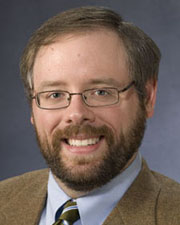
University of Kansas associate professor Eric Deeds will be giving a talk on Tuesday, Nov. 13. His talk, "Fundamental Trade-Offs Between Information Flow in Single Cells and Cellular Populations," will begin at 4 p.m. in 115 Avery Hall. There will also be a reception preceding the talk, beginning at 3:30 p.m. in 348 Avery Hall.
Abstract: Human cells have the remarkable capacity to self-organize their behavior in order to generate and maintain complex tissues and organ systems. Cells accomplish this largely through intercellular communication, using a combination of endocrine, paracrine, autocrine and contact signaling to coordinately regulate their activities. A major thrust of research in my lab is aimed at understanding the function of the cell signaling networks that process and interpret intracellular cues. One striking characteristic of human cell signaling networks is their heterogeneity: it has been found that, even within isogenic populations of the same cell type, different cells within the population often respond very differently to the same stimulus. This high degree of heterogeneity significantly limits the amount of information that individual cells can have about their environment. Using the framework of information theory, we recently demonstrated that high levels of heterogeneity can actually be advantageous, allowing tissues to exert precise control over processes like differentiation or cell death at the population level. Interestingly, we found that much higher levels of information flow were present when considering cases where individual cells, rather than populations, were being controlled by the input signal. This suggests that, rather than arising as an unavoidable consequence of noise in biochemical reaction networks, heterogeneity may in fact be highly regulated by particular cellular systems. Understanding the sources and physiological role of this heterogeneity is key to the development of approaches for treating cancer and other diseases where dysregulation of cell signaling plays a major role in the pathophysiology of the disease.